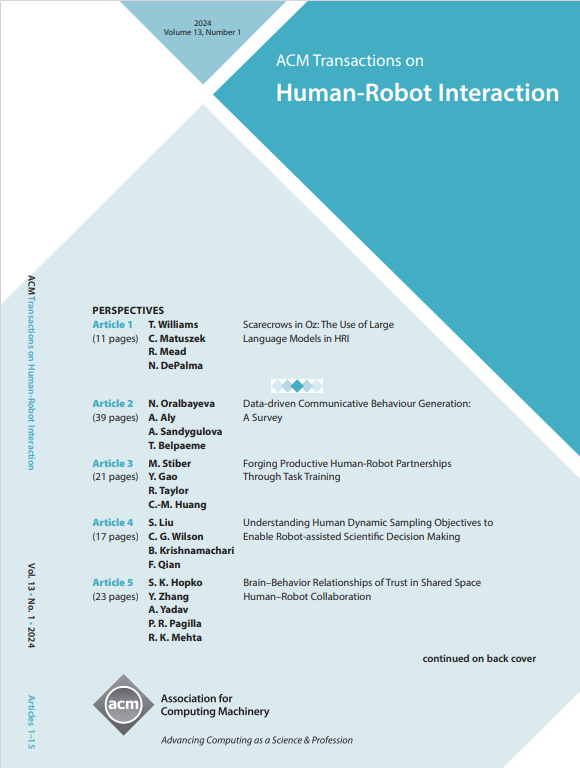变得聪明:与认知辅助机器人合作的目标设定
IF 5.5
Q2 ROBOTICS
引用次数: 0
摘要
许多机器人提供的健康干预措施旨在长期支持人们在家补充或取代诊所治疗。然而,关于机器人如何支持协同目标设定(CGS)的指导很少。CGS是一个过程,在这个过程中,一个人与临床医生一起设定和修改他们的护理目标;它可以提高治疗依从性和疗效。然而,对于家庭部署的机器人,随着时间的推移,临床医生帮助设定和修改目标的可用性将受到限制,这就需要机器人自己支持CGS。在这项工作中,我们探索了机器人如何在我们的机器人CARMEN(动机和神经康复认知辅助机器人)的背景下促进CGS, CARMEN为轻度认知障碍(PwMCI)患者提供神经康复。我们与临床神经心理学家和PwMCI共同设计了支持CGS的机器人行为,并在CARMEN上进行了原型化。我们提出了关于PwMCI如何设想这些行为在干预期间支持目标进展和动机的反馈。我们报告了如何用家庭部署的机器人支持这一过程的见解,并提出了一个框架,以支持有兴趣在认知辅助机器人和其他背景下探索这一点的HRI研究人员。这项工作支持在机器人上设计和实施CGS,这将最终扩大机器人提供的健康干预措施的效力。本文章由计算机程序翻译,如有差异,请以英文原文为准。
Get SMART: Collaborative Goal Setting with Cognitively Assistive Robots
Many robot-delivered health interventions aim to support people longitudinally at home to complement or replace in-clinic treatments. However, there is little guidance on how robots can support collaborative goal setting (CGS). CGS is the process in which a person works with a clinician to set and modify their goals for care; it can improve treatment adherence and efficacy. However, for home-deployed robots, clinicians will have limited availability to help set and modify goals over time, which necessitates that robots support CGS on their own. In this work, we explore how robots can facilitate CGS in the context of our robot CARMEN (Cognitively Assistive Robot for Motivation and Neurorehabilitation), which delivers neurorehabilitation to people with mild cognitive impairment (PwMCI). We co-designed robot behaviors for supporting CGS with clinical neuropsychologists and PwMCI, and prototyped them on CARMEN. We present feedback on how PwMCI envision these behaviors supporting goal progress and motivation during an intervention. We report insights on how to support this process with home-deployed robots and propose a framework to support HRI researchers interested in exploring this both in the context of cognitively assistive robots and beyond. This work supports designing and implementing CGS on robots, which will ultimately extend the efficacy of robot-delivered health interventions.
求助全文
通过发布文献求助,成功后即可免费获取论文全文。
去求助
来源期刊

ACM Transactions on Human-Robot Interaction
Computer Science-Artificial Intelligence
CiteScore
7.70
自引率
5.90%
发文量
65
期刊介绍:
ACM Transactions on Human-Robot Interaction (THRI) is a prestigious Gold Open Access journal that aspires to lead the field of human-robot interaction as a top-tier, peer-reviewed, interdisciplinary publication. The journal prioritizes articles that significantly contribute to the current state of the art, enhance overall knowledge, have a broad appeal, and are accessible to a diverse audience. Submissions are expected to meet a high scholarly standard, and authors are encouraged to ensure their research is well-presented, advancing the understanding of human-robot interaction, adding cutting-edge or general insights to the field, or challenging current perspectives in this research domain.
THRI warmly invites well-crafted paper submissions from a variety of disciplines, encompassing robotics, computer science, engineering, design, and the behavioral and social sciences. The scholarly articles published in THRI may cover a range of topics such as the nature of human interactions with robots and robotic technologies, methods to enhance or enable novel forms of interaction, and the societal or organizational impacts of these interactions. The editorial team is also keen on receiving proposals for special issues that focus on specific technical challenges or that apply human-robot interaction research to further areas like social computing, consumer behavior, health, and education.
 求助内容:
求助内容: 应助结果提醒方式:
应助结果提醒方式:


